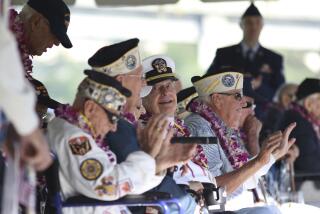An old salt recalls wounds of Pearl Harbor
Ninety-one-year-old Constantine Socrates Savalas stepped on the stage at Los Angeles Valley College’s music recital hall and surveyed the younger faces before him.
“I stand before you as a witness to the destruction of ships and destroyers at Pearl Harbor on Dec. 7, 1941,” said Savalas, briefly describing the surprise attack by the Japanese that killed 2,459 Americans and drew this country into World War II.
PHOTOS: A date which will live in infamy
He paused, then sang in a strong baritone:
There’s a grief that can’t be spoken.
There’s a pain goes on and on.
Empty chairs at empty tables.
Now my friends are dead and gone.
His rendition of the tune from the musical “Les Miserables” is something of a tradition at the Valley Glen campus’ December music performance workshop concerts.
Savalas, brother of the late actor Telly Savalas, loves to sing and has attended the workshops for 18 years. He always chooses “Empty Chairs at Empty Tables” at the annual performance — his personal tribute to the people who died 70 years ago Wednesday in the event that devastated the U.S. Navy’s Pacific Fleet.
“Not many others in the class know the significance of Pearl Harbor,” said music professor Robert Chauls, who has taught at Valley College for four decades.
Savalas, a Lake Balboa resident, is his oldest and longest-enrolled student, and “he sings as well as anyone else in the class,” Chauls said.
Savalas was aboard the heavy cruiser Astoria that had left Pearl Harbor and was off the island of Oahu when 353 Japanese fighters struck in what President Franklin D. Roosevelt called “a date which will live in infamy.”
He was operating his ship’s radio when the Morse code call for help came from Pearl Harbor.
“The message said ‘This is not a drill! Come to our aid! We’re under attack!’ and it was repeated over and over,”’ Savalas said. “I ran and woke up my communications officer. He was aggravated at first that I had awakened him.”
When the Astoria hurried back to Pearl Harbor, Savalas and his shipmates were stunned at what they saw. All eight of the Navy’s mighty battleships were sunk or badly damaged. So were three cruisers, three destroyers, a minelayer and an anti-aircraft training ship.
“The fires were still burning. It was unbelievable they had gotten these big ships,” he said.
“Great ships — as long as the length of this campus,” is how he described them to the workshop participants. “The Arizona, the Oklahoma, the California, the West Virginia, the Nevada.”
Savalas helped retrieve the bodies of sailors killed on the battleship West Virginia after the sunken craft was refloated. “I took out 30. I couldn’t believe this had happened to the United States,” he said.
The Astoria went on to fight in the Battle of the Coral Sea, where Savalas watched as the aircraft carrier Lexington was damaged so heavily that it had to be scuttled by its crew.
“We rescued several hundred men from the Lexington. We were all thinking we might be next,” he said.
As it happened, the Astoria was sunk three months later. But by then, Savalas had left the ship to become a radioman with the Naval Air Corps. He ended up serving seven years in the Navy, and later worked for the State Department as an embassy information officer in Lebanon, India, London, Somalia and Libya.
The son of Greek immigrants, Savalas speaks Greek and served his last stint in Greece.
Unlike his younger brother, Savalas never went into acting. But after leaving the State Department in 1976, Savalas worked with Telly Savalas as a script advisor and coach, including several installments of his brother’s signature “Kojak” show.
Savalas was rewarded with heavy applause from the crowd of about 50 when he finished “Empty Chairs and Empty Tables” with pianist Hae-Sun Pope. (He will reprise the song at 11:20 a.m. Thursday at another free workshop performance.)
Afterward, his fellow students swarmed around him.
“He’s an amazing singer and person,” said Ben Letinsky, a 21-year-old music major. “He jokes around with you like we’re both young.”
“Constantine is a great inspiration,” said classmate Edward Hernandez, 40. “Younger generations forget what their great-grandfather’s generation went through.”
PHOTOS: A date which will live in infamy
More to Read
Get the L.A. Times Politics newsletter
Deeply reported insights into legislation, politics and policy from Sacramento, Washington and beyond. In your inbox three times per week.
You may occasionally receive promotional content from the Los Angeles Times.











